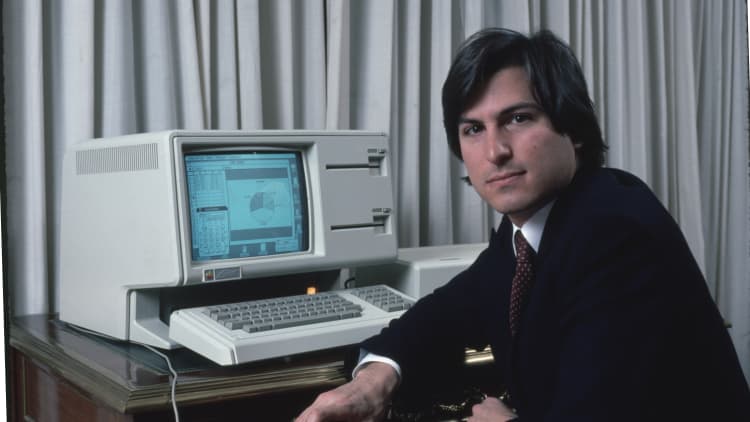Before Steve Jobs was the serious, turtleneck-wearing CEO and co-founder of Apple, he was a young guy who would goof off, scheme elaborate pranks and go to concerts with friends.
According to Apple co-founder Steve Wozniak, Jobs' personality shifted once he became the founder of "a company with big money," Wozniak told Guy Kawasaki, who worked at Apple in the 1980s, on his podcast Guy Kawasaki's Remarkable People.
When Wozniak and Jobs met in the '70s, the pair bonded over their love of electronics and shenanigans, and would go to concerts together, "chasing concert paraphernalia, driving around playing pranks, doing the blue boxes," Wozniak said. "We had a lot of fun times."
They founded Apple Computers, Inc. in 1976, when Jobs was 21 and Wozniak was 26.
Wozniak said the antics stopped after Apple received its first big investment, a guaranteed bank loan of $250,000 from Mike Markkula in 1977 (the equivalent of over $1.1 million), and the company started to take off.
"[Jobs] all the sudden disdained that," Wozniak said. "He didn't want to talk about jokes, [or] fun kid things, only business suits on the front of magazines, talking business talk and learning how to speak it."
Instead, Jobs focused on developing his personal brand and "becoming sort of a different presence to the world," Wozniak said. "That's when his personality changed, and he got kind of strict."
As a leader, Jobs had a reputation for being demanding. Even the way he dressed was severe: In the '80s, he started wearing his personal uniform of a black turtleneck designed by Issey Miyake and jeans, because he heard that Sony employees wore uniforms. (One that Theranos founder Elizabeth Holmes later emulated.)
Wozniak said that from the day he met Jobs, his friend would talk about important historical figures who "have really changed humanity forever," like William Shakespeare.
"He wanted to be one of them, and he felt he had the motivation," Wozniak said. "Sometimes motivation, wanting something, is a lot more important than having the real skill."
On the other hand, Wozniak said he himself wanted nothing to do with fame or money and was perfectly content being a computer engineer designing calculator chips at Hewlett-Packard for life, where he worked before Apple. "I loved it, and I didn't want to ever be corrupted by big money," he said. (Wozniak's net worth is an estimated $100 million as of 2017.)
Jobs was less hands-on when it came to developing computer software, and instead focused on design, advertising and talking to press, Wozniak said. "One thing he wanted was to somehow be important in the world, though he didn't have the academic or business, background, he had me," he said.
Wozniak believes that Jobs' stark shift in his comportment was a way of communicating that he could be a legitimate business person. "He wanted to make sure the world got a message that all the computer thinking came from him his head, and his thinking," Wozniak said.
To this day, Wozniak said still is on the Apple payroll "out of loyalty," although he left the company in 1985. He receives about $50 a week, and has joked that he still reports to Jobs, who died in 2011 from pancreatic cancer.
In late 2019, Apple's market cap reached a record $1.4 trillion, and tech analysts predict that it could reach a $2 trillion valuation at the end of 2021.
But Wozniak insists that money, power and fame are not the factors guiding his life. "I only want to know interesting people, like Steve Jobs for instance," he said.
Like this story? Subscribe to CNBC Make It on YouTube!
Don't miss:



